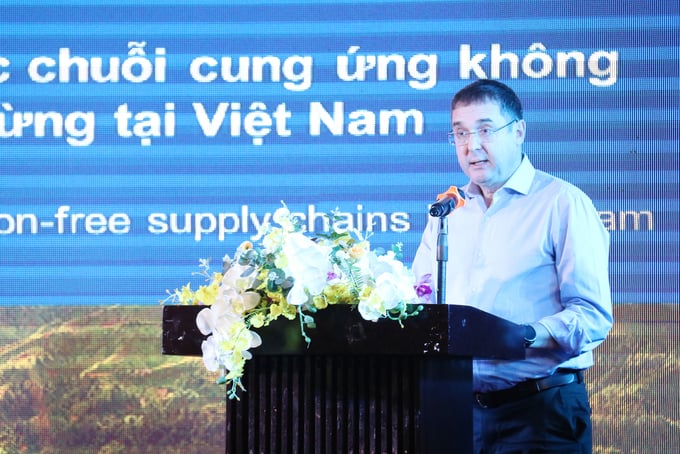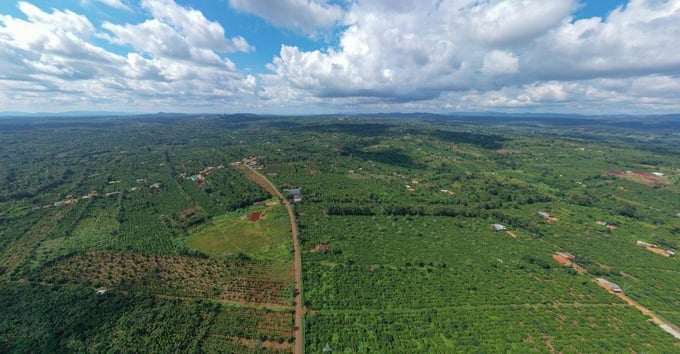June 14, 2025 | 22:10 GMT +7
June 14, 2025 | 22:10 GMT +7
Hotline: 0913.378.918
June 14, 2025 | 22:10 GMT +7
Hotline: 0913.378.918

Mr. Rui Ludovino spoke at the workshop. Photo: Quang Yen.
On July 12, in Dak Lak province, the Ministry of Agriculture and Rural Development (MARD) coordinated with the Delegation of the European Union to Vietnam (EEAS) to organize a workshop to discuss technical issues on the EU Deforestation Regulation (EUDR).
More than 80 representatives from central ministries, branches, and local agencies in the Central Highlands attended the conference, along with coffee, wood, and rubber businesses.
The EUDR takes effect on December 30, 2024. It requires that agricultural products imported into the EU market and exported from the EU do not originate from land due to deforestation or contribute to forest degradation, starting December 30, 2020.
According to this regulation, some of Vietnam's main export products to the EU market, such as coffee, wood, and rubber, must be traced to each garden.
Mr. Nguyen Do Anh Tuan, Director of the International Cooperation Department (MARD), emphasized that Vietnam is ready to meet EUDR regulations. According to Mr. Tuan, implementing EUDR is an opportunity for Vietnam's agriculture to transform in a green and sustainable direction through agricultural, farmer, and rural development orientation.

The coffee region in Dak Lak province is certified to comply with EUDR. Photo: Quang Yen.
Mr. Rui Ludovino, the First Counselor for policies on climate, environment, employment, and social issues of the EU delegation to Vietnam, affirmed: "EUDR will contribute to reducing global deforestation and forest degradation worldwide, thereby reducing greenhouse gas emissions. EUDR also helps address two major contemporary crises: biodiversity loss and climate change".
He also said that increasing EU demand and trade in legal, deforestation-free commodities and products will create opportunities for small-scale farmers in Vietnam. EUDR compliance will improve people's production systems, enhancing product quality and traceability along the supply chain. Product prices and farmers' livelihoods will also improve.
With the EUDR, the EU aims to reduce the problem of deforestation and forest degradation globally and thereby minimize the impact of climate change, greenhouse gas emissions, and biodiversity loss.
In particular, the EU wants to emphasize that the EUDR regulation only focuses on businesses, not countries or manufacturers in third countries, which is a new approach aiming to require companies to exercise full accountability.
Translated by Huong Giang

(VAN) The working delegation from the Ministry of Agriculture and Environment conducted an important trip to the Netherlands to strengthen strategic partnerships and sustainable development in the agricultural sector.

(VAN) The letter ‘A Plea from the Ocean’ not only evokes emotion but also awakens the human conscience to the responsibility of protecting life on Earth.

(VAN) The Department of Agriculture in South Africa has announced the country’s first mass vaccination of poultry to prevent local birds from contracting avian influenza.

(VAN) Establishment of the Mekong Delta Regional Agricultural Linkage Center, aiming for a closed value chain, deep processing, trading platforms, and international market connectivity.

(VAN) Gia Lai province has recently recorded 460 rare species of animals and plants, contributing to forest conservation and biodiversity planning in the region.

(VAN) Ms. Caroline Beresford, New Zealand Ambassador to Vietnam, expressed confidence that agricultural cooperation between Vietnam and New Zealand will develop sustainably, be climate-resilient, and promote gender equality.

(VAN) Vietnam reaffirms its commitment to international cooperation in fostering sustainable and responsible fisheries while ensuring resilient livelihoods for small-scale fishing communities.